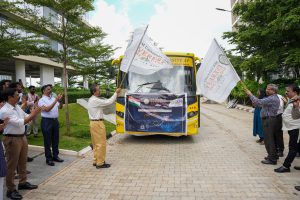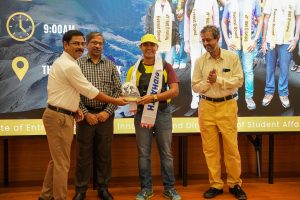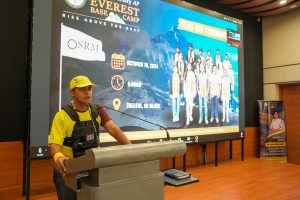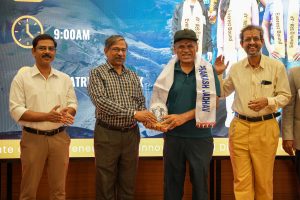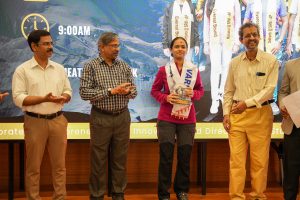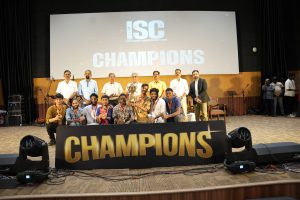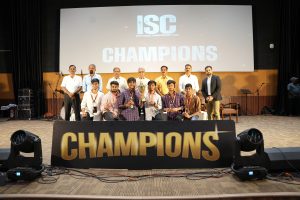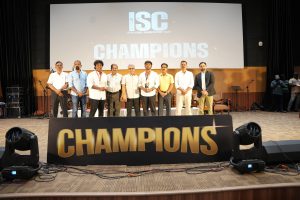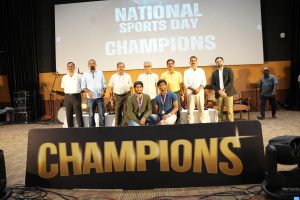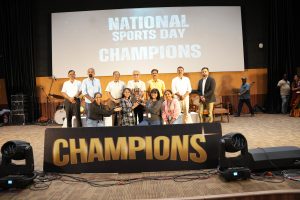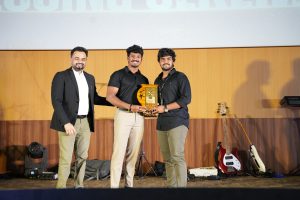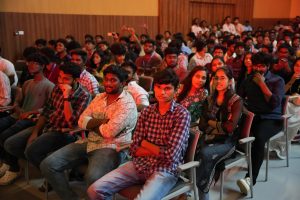Breakthrough in Autism Detection: A New System Patent by CSE Researchers
 In a significant advancement for neurodevelopmental research, Dr Nitul Dutta, Associate Professor in the Department of Computer Science and Engineering, along with PhD scholar Ms Surya Samantha Beri and BTech student Mr Nallamothu Sai Karthik, have successfully filed and published a patent titled “A System for Autism Spectrum Disorder Detection.” The application, numbered 202441053505, has been officially documented in the Patent Office Journal.
In a significant advancement for neurodevelopmental research, Dr Nitul Dutta, Associate Professor in the Department of Computer Science and Engineering, along with PhD scholar Ms Surya Samantha Beri and BTech student Mr Nallamothu Sai Karthik, have successfully filed and published a patent titled “A System for Autism Spectrum Disorder Detection.” The application, numbered 202441053505, has been officially documented in the Patent Office Journal.
The innovative system aims to enhance the early detection of Autism Spectrum Disorder (ASD), providing a more efficient and accessible method for diagnosis. By integrating advanced algorithms and machine learning techniques, the system promises to analyse behavioural data effectively, allowing for timely interventions and support for individuals on the spectrum. Dr Dutta emphasised the importance of early detection, stating, “The earlier we can identify ASD, the better the outcomes for individuals and their families. Our system is designed to make this process more accurate and user-friendly.”
Ms Beri and Mr Karthik contributed significantly to the research, which reflects a collaborative effort between academia and technology. Their work not only demonstrates the potential for technological solutions in healthcare but also highlights the critical role of interdisciplinary approaches in addressing complex challenges.
This patent represents a crucial step forward in the field of autism research and is expected to pave the way for further innovations aimed at improving the lives of those affected by ASD.
Abstract of the Research
The system for autism spectrum disease detection incorporates a server with a hybrid application comprising several key modules: a capturing module receiving images from image-capturing devices , a data collection module gathering a dataset of images from multiple capturing devices, and a pre-processing module standardising and normalising images to generate a standardised dataset. Additionally, a feature extraction module collaborates with the pre-processing module to identify autism-indicative features in standardised images, preparing labelled standardised images stored in the data collection module.

Furthermore, a data segmentation module segments standardised images into training and testing data, including a training module for real-time training of a convolutional neural network model and a testing module to evaluate the convolutional neural network model’s accuracy in detecting autism based on testing data.
Explanation of the Research in Layperson’s Terms
The background information herein below relates to the present disclosure but is not necessarily prior art. Autism spectrum disorder (ASD) is a neurological or developmental disorder that profoundly impacts communication skills, social interaction, and cognitive abilities in individuals. Those with Autism Spectrum Disorder (ASD) often exhibit challenges in social interaction, limited eye contact, difficulty understanding social cues, and impaired language skills. Additionally, repetitive behaviours and sensory sensitivities are common characteristics.
The disorder arises from developmental changes in brain structure and can have various causes, including genetic factors, familial history of autism spectrum disorder (ASD), advanced parental age, or low birth weight. The prevalence of autism spectrum disorder (ASD), as reported by the World Health Organization (WHO), stands at one in every 160 children. Early detection and intervention are crucial for managing autism spectrum disorder (ASD) effectively, as interventions such as medical and neurological examinations, cognitive and language assessments, and frequent observations, including blood and hearing tests, can significantly improve outcomes. Detecting Autism Spectrum Disorder (ASD) in children below the age of 10 is comparatively easier than in adults, underscoring the importance of early diagnosis to facilitate timely interventions.
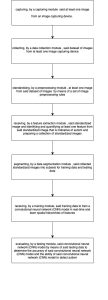
Current diagnostic processes for autism spectrum disorder (ASD) often present significant challenges, particularly for young children, due to their limited ability to communicate and cooperate during assessments. Traditional diagnostic methods rely heavily on structured interviews, behavioural observations, and standardised tests, which can be daunting and stressful for children, leading to inaccurate results. Moreover, these procedures are time-consuming and often require multiple visits to specialised clinics or healthcare facilities, causing inconvenience and financial strain for families. Also, the cost associated with autism spectrum disorder (ASD) diagnosis can be prohibitive for many families.
Therefore, there is a pressing need for more accessible, less intrusive, and cost-effective methods for detecting autism spectrum disorder (ASD) in its early stages to ensure timely and effective intervention. Therefore, there is a need for a system for autism spectrum disorder detection that alleviates the drawbacks.
Practical and Social Implications Associated with the Research
Current diagnostic procedures for Autism Spectrum Disorder (ASD) face considerable technical challenges, particularly concerning young children’s limited ability to engage in conventional assessment methods. These methods typically rely on structured interviews, behavioural observations, and standardised tests, all of which can be arduous and distressing for children with Autism Spectrum Disorder (ASD), potentially leading to unreliable outcomes. Furthermore, these procedures are resource-intensive, requiring multiple visits to specialised clinics or healthcare facilities, thereby causing logistical challenges and financial burdens for families. Current diagnostic processes for Autism Spectrum Disorder (ASD) often present significant challenges, particularly for young children, due to their limited ability to communicate and cooperate during assessments. Traditional diagnostic methods rely heavily on structured interviews, behavioural observations, and standardised tests, which can be daunting and stressful for children, leading to inaccurate results. Moreover, these procedures are time-consuming and often require multiple visits to specialised clinics or healthcare facilities, causing inconvenience and financial strain for families. Also, the cost associated with Autism Spectrum Disorder (ASD) diagnosis can be prohibitive for many families. Therefore, there is a pressing need for more accessible, less intrusive, and cost-effective methods for detecting Autism Spectrum Disorder (ASD) in its early stages to ensure timely and effective intervention.
Collaborations
This research was done in collaboration with Professor George, Brunel University, London, United Kingdom
Future Research Plans
In the future, we will also try to diagnose the disorder by speech therapy using Natural Language Processing and integrate it with real-time industry in health care, which can be used by many doctors in their respective practices
- Published in CSE NEWS, Departmental News, News, Research News
1st Private University in India to Send a Student Expedition to Mt. Everest Base Camp
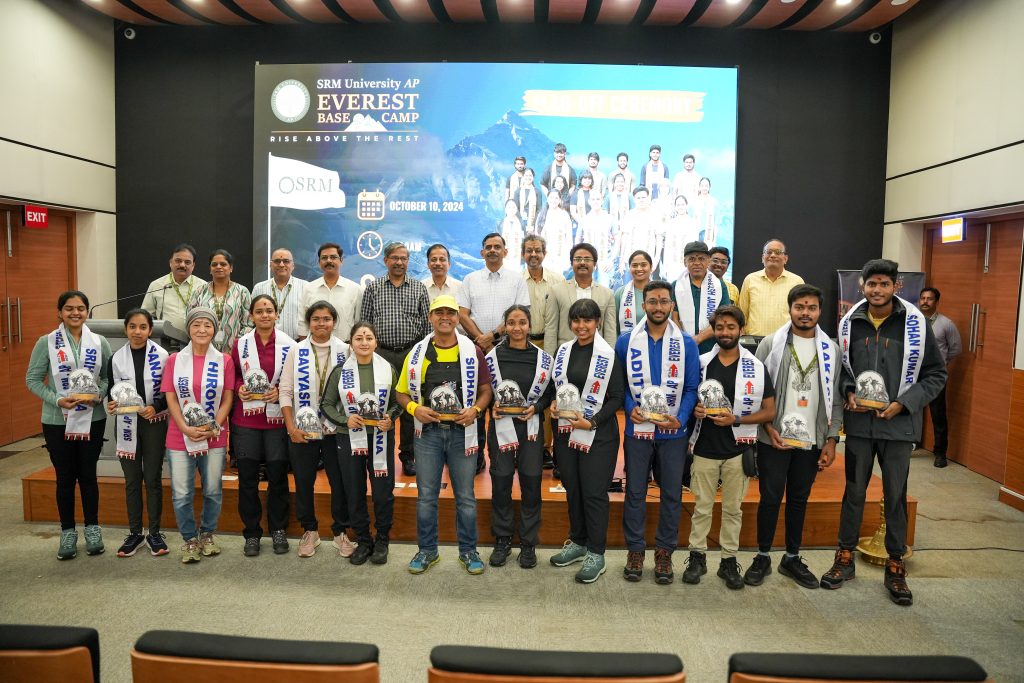
SRM University-AP flagged off the much-awaited Everest Base Camp Expedition that will take place from October 12 – 27, 2024. This is India’s first initiative by any private university in India to send a team of 18 students and faculty under the leadership of Mr Sidharth Tripathy, Director-Entrepreneurship and Innovation, to conquer Mt. Everest Base Camp. The audacious adventure was flagged off by Dr R Premkumar, Registrar, and Prof. Bharadhwaj Sivakumaran, Dean of Paari School of Business, in the presence of Mr Anil Kumar Nigam, Director-Student Affairs, Mr Udayan Bakshi, Associate Director-Entrepreneurship & Innovation, Prof. C V Tomy, Dean-SEAS and the cheering students of the university.
“To enhance the quality of entrepreneurship, it is pivotal to foster a mindset that can take risks, tackle huge challenges and overcome tribulations from a broader perspective. Our motive as a 21st-century university is to cultivate this mindset through this thrilling adventure and to become the harbingers of transformation among students,” remarked the expedition leader, Mr Sidharth Tripathy. The 15-day exhilarating expedition jointly organised by the Directorate of Entrepreneurship & Innovation and the Directorate of Student Affairs will begin from Kathmandu and will reach Everest Base Camp, covering a distance of about 134 km and scaling a height of 17,598 ft.
In his address to the voyagers, Dr R Premkumar wished the group a safe and successful journey and opined, “This is an adventure of a lifetime that will teach you to live as a group, to grow as a team and contribute to each other for a common goal”. In addition to providing students with exemplary academic, research and entrepreneurial resources, SRM University-AP also emphasises the significance of nurturing 21st-century skills through experiential projects and initiatives. The Everest Base Camp expedition is a one-of-a-kind adventure that will ensure that students imbibe the value of belief, the significance of planning, training and camaraderie to develop essential leadership skills.
- Published in Departmental Events, IDEA NEWS, News, student affairs news
Breakthrough in Mathematical Research: Dr Subha Sandeep Repaka’s Innovative Study on Unitary Groups
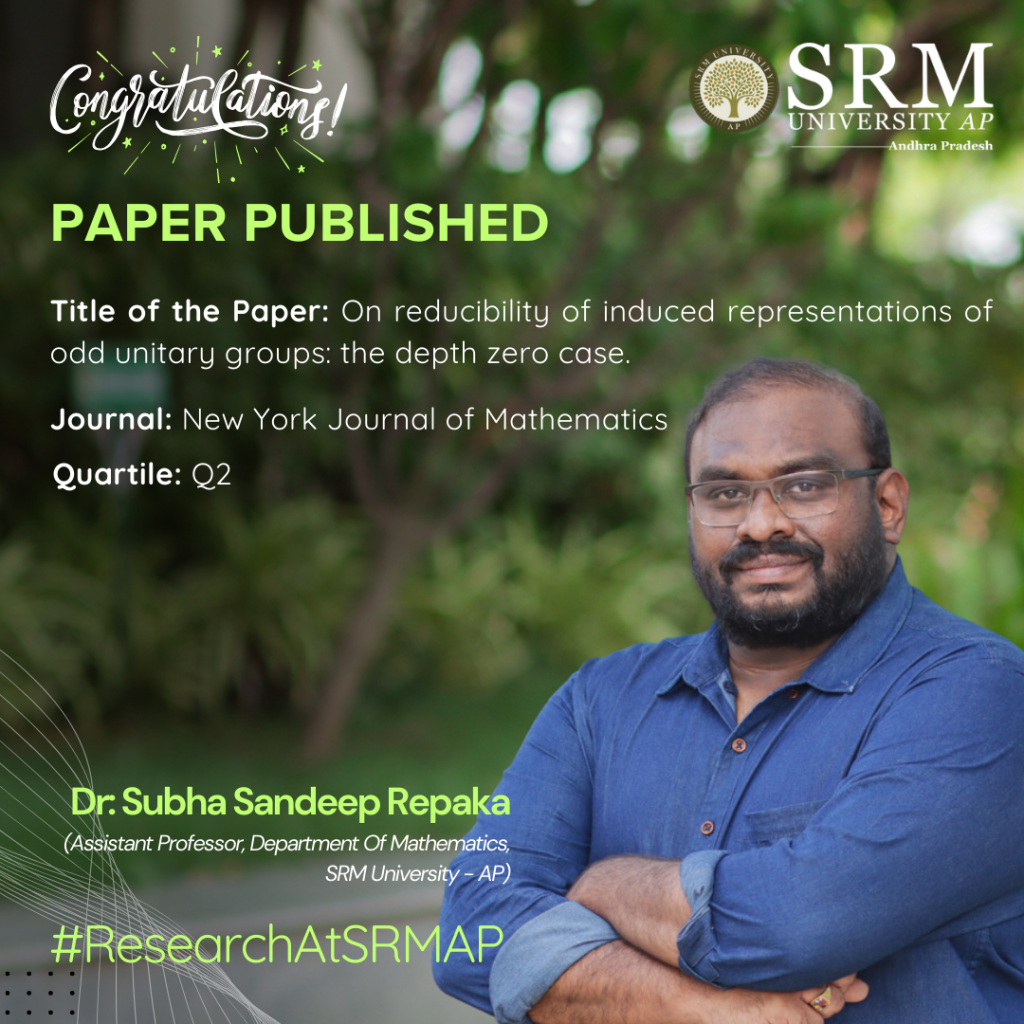
The Department of Mathematics, SRM University-AP, is pleased to announce that Assistant Professor Dr Subha Sandeep Repaka has published a significant research paper titled “On Reducibility of Induced Representations of Odd Unitary Groups: The Depth Zero Case.” This accomplishment reflects Dr Repaka’s expertise and dedication to advancing mathematical research, further enriching the academic contributions of the department and the university.
Abstract:
We study a problem concerning parabolic induction in certain $p$-adic unitary groups. More precisely, for $E/F$ a quadratic extension of $p$-adic fields the associated unitary group $G=\mathrm{U}(n,n+1)$ contains a parabolic subgroup $P$ with Levi component $L$ isomorphic to $\mathrm{GL}_n(E) \times \mathrm{U}_1(E)$. Let $\pi$ be an irreducible supercuspidal representation of $L$ of depth zero. We use Hecke algebra methods to determine when the parabolically induced representation $\iota_P^G \pi$ is reducible.
Future Research Plans:
We would like to solve the same problem which I had solved in this paper for the groups U(n,n) and U(n,n+1) over p-adic fields using L-Functions which is a very novel approach.
The link to the article:
http://nyjm.albany.edu/j/2024/30-50.html

- Published in Departmental News, Math News, News, Research News
Celebrating Sporting Excellence at Inter School Sports Championship
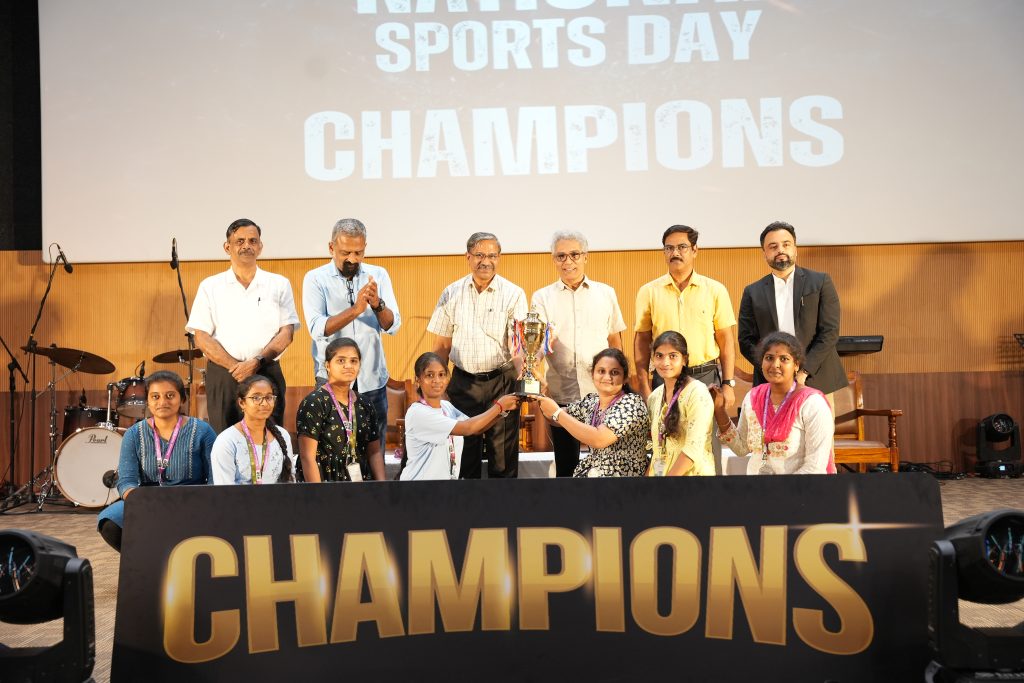 The Directorate of Sports at SRM University-AP proudly hosted the grand closing ceremony of the Inter School Sports Championship (ISC), a celebration of sportsmanship, teamwork, and dedication among students. The event, attended by esteemed guests including Chief Guest Naveen Chary, a renowned fitness influencer, Registrar Dr R Premkumar, Deans, Directors, and a vibrant crowd of students, marked the culmination of a remarkable four-week journey.
The Directorate of Sports at SRM University-AP proudly hosted the grand closing ceremony of the Inter School Sports Championship (ISC), a celebration of sportsmanship, teamwork, and dedication among students. The event, attended by esteemed guests including Chief Guest Naveen Chary, a renowned fitness influencer, Registrar Dr R Premkumar, Deans, Directors, and a vibrant crowd of students, marked the culmination of a remarkable four-week journey.
The ISC Championship witnessed the enthusiastic participation of 2,247 students from all three schools: the School of Engineering and Sciences, the Paari School of Business, and the Easwari School of Liberal Arts. Participants showcased their skills in a variety of sports, promoting camaraderie and school spirit throughout the event.
Among the games, cricket was the most popular, attracting 900 participants; Badminton followed with 482 participants and volleyball with 256 participants. The football, basketball, and chess competitions also saw enthusiastic participation, with 180, 102, and 167 players, respectively. The School of Engineering and Sciences (SEAS) emerged as the triumphant winner of the prestigious rolling trophy.
“This championship has not only highlighted our students’ athletic abilities but has also been instrumental in cultivating a culture of sportsmanship at SRM University-AP,” said Dr Dhiraj Parasher, Director of Sports, SRM University-AP. “It has opened pathways for students to consider sports as a viable career option, enriching their overall university experience.”
The closing ceremony featured an engaging live performance by Band Kadali, along with captivating classical and Western dance performances by talented students.
In his address, Registrar Dr R Premkumar reflected on the significance of the event: “As we celebrate these achievements, let us carry forward the enthusiasm and lessons learned during this championship into all our future endeavours, both in sports and academics. The friendships forged and experiences gained here will resonate within our community for years to come.”
The ISC Championship has proven to be more than just a competitive event; it has served as a platform for personal growth, team spirit, and the forging of lasting bonds among students, making it a memorable chapter in the SRM University-AP journey.
- Published in Departmental News, News, Sports News




